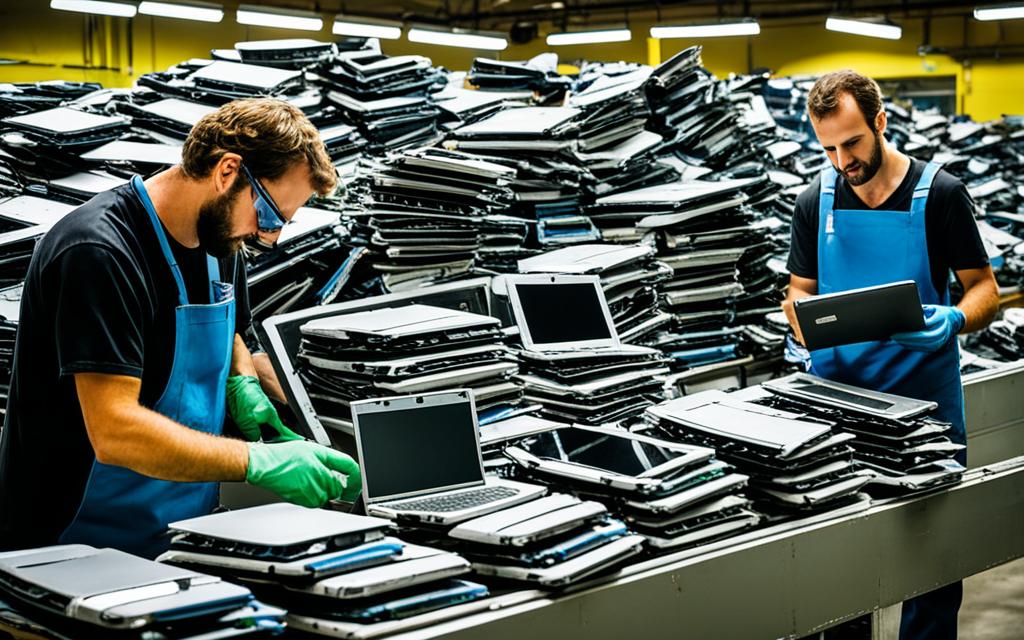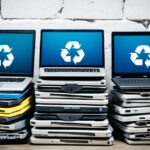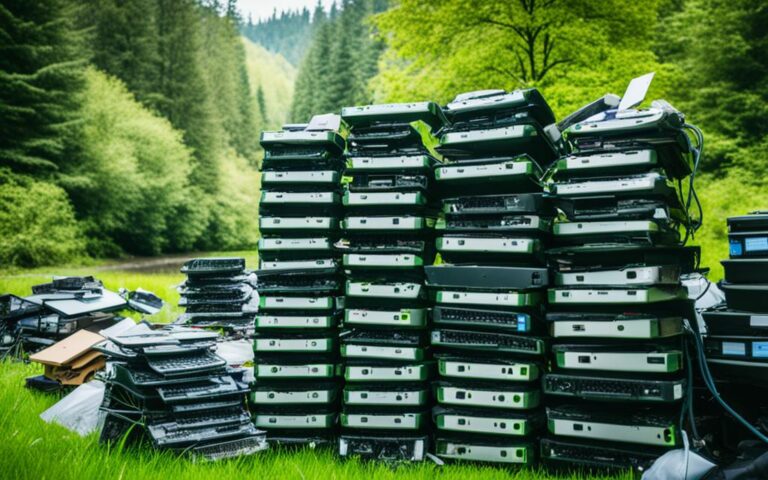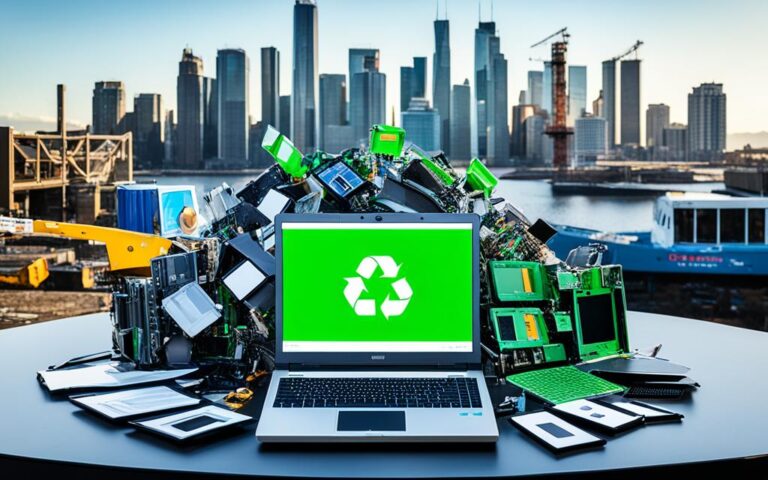Netbook Recycling Programs: How They Work and Why They Matter
Netbook recycling programs are essential for eco-friendly disposal and sustainable e-waste management. As technology continues to advance at a rapid pace, outdated and damaged netbooks contribute to the growing e-waste problem. The improper disposal of netbooks not only harms the environment but also poses a risk to data security.
Proper recycling or disposal of netbooks through dedicated recycling programs ensures that valuable materials are extracted and reused, reducing the need for excessive mining. This contributes to the conservation of natural resources and mitigates the environmental impact of e-waste. Additionally, netbook recycling programs help in protecting sensitive data stored in these devices, ensuring data privacy and security.
By participating in netbook recycling programs, individuals and businesses can play an active role in sustainable e-waste management. Choosing eco-friendly disposal options, like netbook recycling programs provided by professional recycling companies, promotes responsible and proper disposal of outdated devices.
The Need for Sustainable E-Waste Management
The average UK household owns nearly 25 electronic devices, contributing to a significant accumulation of e-waste. However, only 20% of the annual e-waste in the UK is properly recycled. The lack of sustainable e-waste management poses grave environmental risks and health hazards due to improper disposal practices.
To protect the environment and mitigate these risks, it is crucial to implement sustainable e-waste management practices across the country. By responsibly managing electronic waste, we can create economic opportunities and reduce the harmful effects on our planet and communities.
The Scale of the Issue
UK household electronic devices have become an integral part of our lives. From smartphones and laptops to kitchen appliances and entertainment systems, we rely on these devices daily. However, when they reach the end of their useful life, many of them end up in landfills or incinerators.
With nearly 25 devices per household, the accumulation of e-waste is staggering. Each device contains valuable and potentially harmful materials such as metals, batteries, and plastics. Without proper disposal, these materials can leach into the environment, polluting soil and water sources.
The Importance of Recycling
To address the environmental and health impact of e-waste, it is crucial to increase the annual e-waste recycling rate. Proper recycling enables the recovery of valuable resources while minimizing harm to the environment.
Recycling electronic devices helps conserve natural resources, such as metals and rare earth minerals, by extracting and reusing them in the production of new devices. This reduces the need for mining and the associated ecological damage. Additionally, recycling reduces energy consumption and greenhouse gas emissions compared to manufacturing from virgin materials.
| Benefits of Sustainable E-Waste Management: | Consequences of Improper Disposal: |
|---|---|
|
|
Creating a Sustainable Future
Adopting sustainable e-waste management practices is essential to protect the environment and create a better future. By raising awareness, implementing effective collection systems, and partnering with certified e-waste recycling companies, we can significantly increase the annual e-waste recycling rate in the UK.
Proper e-waste management is not just about recycling; it’s about adopting a circular economy approach. This means designing electronic devices with sustainability in mind, prioritizing repair and reuse, and ensuring responsible disposal at the end of their life cycle.
Ultimately, sustainable e-waste management benefits everyone. It safeguards the environment, conserves valuable resources, and minimizes the negative impact on human health. By working together, we can create a future where electronic devices enhance our lives without harming the planet.
Legal and Regulatory Landscape
The United Kingdom follows the Waste Electrical and Electronic Equipment (WEEE) standard for e-waste management. Under this standard, extended producer responsibility (EPR) initiatives hold manufacturers accountable for the entire lifecycle of their products, including the collection and recycling of e-waste.
The WEEE regulations aim to reduce the environmental impact of electronic waste by promoting responsible recycling practices. By implementing EPR, manufacturers are incentivized to design products that are longer-lasting and easier to repair or recycle, minimizing their overall environmental footprint. This shift towards product stewardship helps create a circular economy, where resources are kept in use for as long as possible, maximizing their value and minimizing waste.
One of the key principles of the circular economy is the idea of closing the loop, which means ensuring that products and materials are recycled or reused rather than being disposed of as waste. By adopting the WEEE standard and implementing EPR initiatives, the UK is taking significant steps towards achieving a more sustainable and circular economy.
Furthermore, the WEEE regulations also require businesses to keep records of the electrical and electronic equipment (EEE) they produce, place on the market, or distribute. This ensures proper traceability and allows authorities to monitor compliance effectively.
Extended Producer Responsibility (EPR)
Extended Producer Responsibility (EPR) is a key component of the WEEE regulations. It places the responsibility for the collection and proper disposal of e-waste on the manufacturers. By implementing EPR, manufacturers are not only responsible for producing high-quality products, but also for managing the end-of-life phase through take-back systems and appropriate recycling channels.
EPR initiatives aim to shift the burden of e-waste management away from local authorities and onto the companies that put the products on the market. This not only holds manufacturers accountable for their environmental impact but also encourages them to design products with recycling and circularity in mind.
“With extended producer responsibility, manufacturers are driven to think about the entire lifecycle of their products, from design to disposal. It sparks innovation and encourages product designs that are more sustainable and easier to recycle.”
The Benefits of the Circular Economy
The circular economy approach, supported by the WEEE regulations and EPR initiatives, offers numerous benefits for the environment, society, and the economy:
- Reduced waste: Proper e-waste management prevents hazardous materials from ending up in landfills or being incinerated, reducing pollution and environmental degradation.
- Resource conservation: Recycling e-waste enables the recovery of valuable materials such as precious metals, plastics, and rare earth elements, reducing the need for extensive mining and preserving natural resources.
- Job creation: Developing a robust e-waste recycling industry creates job opportunities in collection, sorting, refurbishment, and recycling, contributing to local economies.
- Health protection: Responsible e-waste management prevents the release of toxic substances into the environment, protecting human health and well-being.
- Energy savings: Recycling e-waste requires significantly less energy compared to extracting raw materials, contributing to energy conservation and reduced carbon emissions.
By following the WEEE regulations and implementing extended producer responsibility initiatives, the United Kingdom is leading the way in sustainable e-waste management and driving the transition towards a more circular economy.
Implementing Sustainable E-Waste Management
In order to effectively address the growing e-waste problem, it is crucial to implement sustainable e-waste management practices. By following the principles of reduce, reuse, and recycle, businesses and individuals can contribute to a greener and healthier environment. Let’s explore these ethical recycling practices in detail.
Reduce
Reducing the production of e-waste begins with conscious consumption. This means making informed choices when purchasing electronic devices and opting for products that are designed to last longer and have minimal environmental impact. By choosing high-quality products that are built to withstand regular use, we can significantly reduce the amount of electronic waste generated.
Reuse
Encouraging the reuse of electronic devices is another essential aspect of sustainable e-waste management. Rather than discarding old devices, they can be repurposed and utilized by others who may not have access to such technology. Donating or selling used electronics, ensuring they are in proper working condition, extends their lifespan and reduces the need for new manufacturing.
Recycle
When electronic devices have reached the end of their useful life, it is crucial to recycle them properly. Recycling not only extracts valuable materials, such as metals and plastics, but also reduces the need for mining new raw materials. Professional recycling companies employ ethical recycling practices that ensure the safe and responsible disposal of electronic waste, minimizing its impact on the environment.
In fact, recycling a single netbook can save enough energy to power a laptop for up to 12 hours. Additionally, recycling prevents hazardous substances from seeping into the soil and water, safeguarding both the environment and human health.
To illustrate the positive impact of recycling, consider the following table:
| Materials | Energy Saved through Recycling (per ton) | Reduction in Greenhouse Gas Emissions (per ton) |
|---|---|---|
| Gold | 32,000-34,000 kWh | 35,000-40,000 lbs CO2 |
| Silver | 5,000-6,000 kWh | 9,000-11,000 lbs CO2 |
| Palladium | 10,000-11,000 kWh | 23,000-24,000 lbs CO2 |
| Copper | 10,000-15,000 kWh | 15,000-20,000 lbs CO2 |
As seen in the table, recycling valuable materials from electronic devices not only saves energy but also significantly reduces greenhouse gas emissions.
Proper recycling creates a positive ripple effect, preserving natural resources and creating job opportunities in the recycling industry. By choosing ethical recycling practices, we collectively contribute to a healthier society and a greener future.
By taking steps to reduce, reuse, and recycle electronic devices, businesses and individuals can actively participate in sustainable e-waste management. These ethical recycling practices not only protect the environment but also promote resource conservation and the circular economy.
Corporate Responsibility in E-Waste Management
Businesses play a crucial role in e-waste management due to their larger quantity of devices and the constant need for upgrades and replacements. As responsible corporate citizens, it is essential for businesses to prioritize e-waste management and adopt sustainable practices. By implementing green IT initiatives, conducting green events, and partnering with local recycling partners, businesses can make significant contributions to reducing e-waste and promoting environmental sustainability.
Implementing Green IT Initiatives
Green IT initiatives involve integrating environmentally friendly practices and technologies into the operations of businesses. By adopting energy-efficient hardware, implementing power-saving measures, and using virtualization technologies, businesses can reduce their carbon footprint and minimize electronic waste. Green IT initiatives also promote the use of renewable energy sources and support the development of sustainable IT infrastructure.
Conducting Green Events
Organizing and participating in green events can raise awareness about the importance of e-waste management and encourage sustainable practices among employees and stakeholders. These events can focus on topics such as recycling electronic devices, responsible disposal methods, and the benefits of adopting eco-friendly technologies. By hosting or sponsoring green events, businesses can demonstrate their commitment to environmental stewardship and inspire others to follow suit.
Partnering with Local Recycling Partners
Collaborating with local recycling partners is crucial for businesses to ensure proper handling and recycling of electronic waste. By working with reputable recycling companies that specialize in e-waste management, businesses can guarantee that their outdated devices are recycled responsibly, in compliance with legal and environmental regulations. Local recycling partners can also provide guidance on waste reduction strategies and assist businesses in implementing effective recycling programs.
“Participating in green IT initiatives, conducting green events, and partnering with local recycling partners are effective ways for businesses to demonstrate their commitment to sustainability and responsible e-waste management.”
Image:
By actively engaging in these corporate responsibility measures, businesses can not only minimize their ecological impact but also reap numerous benefits. Implementing green IT initiatives, conducting green events, and partnering with local recycling partners can enhance a company’s brand image, attract eco-conscious customers, and contribute to a healthier environment for future generations.
Corporate Sustainability Programs
Corporate sustainability programs are an essential aspect of responsible business practices. One exemplary initiative that highlights environmental conservation is Apple’s mangrove tree initiative. By replanting mangrove trees, Apple demonstrates its commitment to minimizing its impact on the planet and promoting a circular economy.
The Apple’s mangrove tree initiative focuses on restoring and protecting mangrove forests, which are critical ecosystems that provide numerous benefits. These lush green forests act as a natural carbon sink, aiding in the reduction of greenhouse gas emissions. Mangroves also protect coastlines from erosion, enhance biodiversity by providing habitats for various species, and improve water quality. By investing in this initiative, Apple showcases how responsible business practices can contribute to the preservation of natural resources.
Through their sustainability programs, businesses like Apple not only benefit the environment but also generate economic advantages. By integrating sustainable practices into their operations, companies can enhance their brand reputation, attract environmentally conscious customers, and drive innovation. Additionally, sustainability initiatives often create job opportunities and foster collaborations with local communities, further strengthening the bond between businesses and society.
Implementing these programs necessitates a holistic approach that incorporates sustainable supply chains, energy-efficient practices, waste reduction, and ethical manufacturing processes. The commitment to responsible business practices showcased by Apple and other companies serves as a catalyst for other organizations to follow suit. Together, businesses can contribute to a greener future and inspire change on a global scale.
“Responsible business practices are not only crucial for the environment but also for long-term success and sustainability. By integrating sustainability into our operations, we create value for our stakeholders while making a positive impact on the planet.”
– Tim Cook, CEO of Apple
To illustrate the impact of Apple’s mangrove tree initiative, consider the following comparison:
| Before the Initiative | After the Initiative |
|---|---|
| Decaying mangrove forests | Revitalized and thriving mangrove ecosystems |
| Increased carbon emissions in the atmosphere | Reduced carbon footprint due to carbon sequestration by mangrove trees |
| Coastal erosion and loss of natural habitat | Protected coastlines and enhanced biodiversity through mangrove restoration |
The comparison table demonstrates the positive transformation brought about by Apple’s initiative in terms of carbon sequestration, protection against erosion, and biodiversity preservation. It highlights the significance of corporate sustainability programs in mitigating environmental challenges and fostering sustainable ecosystems.
Investing in a Greener Future
Apple’s commitment to responsible business practices extends beyond the mangrove tree initiative. The company adopts a comprehensive approach to sustainability, encompassing energy-efficient technologies, renewable energy sources, and the reduction of waste and emissions throughout its entire supply chain.
Apple’s mangrove tree initiative is just one example of how businesses can contribute to a sustainable and environmentally conscious future. By prioritizing responsible business practices and implementing sustainability programs, companies can pave the way towards a greener world.
Technological Innovations in E-Waste Management
Technological advancements have revolutionized the field of e-waste management, offering innovative solutions to address the growing environmental concerns. From blockchain technology to automated sorting systems powered by artificial intelligence, these groundbreaking technologies are shaping the future of sustainable e-waste practices.
Blockchain Technology: Enhancing Transparency and Accountability
Blockchain technology, known for its secure and decentralized nature, is transforming e-waste management processes. By utilizing blockchain, the entire lifecycle of e-waste can be tracked and recorded, ensuring transparency and accountability at every stage. This technology enables stakeholders to verify the origin of e-waste, providing assurance that it is disposed of in an ethical and sustainable manner.
Through blockchain solutions, organizations can create tamper-proof records of e-waste disposal, simplifying auditing processes and facilitating regulatory compliance. This not only minimizes the risk of illegal dumping or improper recycling but also allows for better monitoring of hazardous materials, improving the overall safety and efficiency of e-waste management.
Automated Sorting Systems: Streamlining Recycling Processes
The introduction of automated sorting systems has significantly streamlined the recycling process of electronic devices. Using advanced sensors and algorithms, these systems can automatically identify and separate different components of e-waste, such as metals, plastics, and circuit boards, with high precision and efficiency.
Automated sorting systems not only save time but also minimize errors and optimize resource recovery. By ensuring accurate segregation of materials, valuable resources can be extracted from e-waste and reintroduced into the production cycle, reducing the need for raw materials and promoting a circular economy.
Artificial Intelligence: Catalyzing Intelligent E-Waste Management
Artificial intelligence (AI) plays a pivotal role in revolutionizing e-waste management through its ability to process vast amounts of data and make informed decisions. AI-powered systems can analyze patterns, predict market demand for recycled materials, and optimize recycling operations to achieve maximum efficiency.
By harnessing the power of AI, e-waste recyclers can minimize costs, improve resource allocation, and enhance the overall recycling rate. These intelligent systems not only contribute to sustainable e-waste management but also pave the way for continuous innovation and improvement in the field.
| Benefits of Technological Innovations in E-Waste Management |
|---|
| Enhanced transparency and accountability throughout the e-waste lifecycle |
| Improved monitoring and tracking of hazardous materials |
| Streamlined recycling processes for efficient resource recovery |
| Minimized risk of illegal dumping and improper recycling |
| Promotion of a circular economy through effective material segregation |
| Reduced dependence on raw materials through resource reuse |
Technological innovations in e-waste management are paving the way for a more sustainable future. Through the integration of blockchain technology, automated sorting systems driven by artificial intelligence, and innovative AI applications, we can ensure responsible disposal, resource recovery, and environmental preservation for generations to come.
Conclusion
Netbook recycling plays a vital role in achieving eco-friendly disposal and sustainable e-waste management. The accumulation of e-waste presents significant environmental and health hazards, making it crucial for businesses and individuals to adopt sustainable practices. By implementing the principles of reducing, reusing, and recycling electronic devices, we can contribute to a circular economy, protect the environment, and create a healthier society.
Choosing eco-friendly disposal options, such as participating in netbook recycling programs offered by professional recycling companies like IT-Recycle UK, ensures responsible and proper disposal of outdated devices. These programs are designed to maximize the recycling potential of netbooks while minimizing their environmental impact. Through ethical and environmentally-conscious practices, we can address the e-waste challenge and work towards a more sustainable future.
From reducing the production of e-waste through conscious consumption to promoting the reuse of electronic devices and advocating for ethical recycling practices, each individual and business can make a difference. By prioritizing netbook recycling and other sustainable e-waste management efforts, we can minimize the negative effects of e-waste on the environment, conserve valuable resources, and pave the way for a greener and healthier world.
FAQ
Why is netbook recycling important?
Netbook recycling is crucial for sustainable e-waste management. Outdated and damaged netbooks contribute to the growing e-waste problem, and improper disposal methods can have a negative impact on the environment.
How many electronic devices does the average UK household own?
The average UK household owns nearly 25 electronic devices, leading to a significant accumulation of e-waste.
What percentage of e-waste in the UK is properly recycled?
Only 20% of annual e-waste in the UK is properly recycled.
What is the Waste Electrical and Electronic Equipment (WEEE) standard?
The United Kingdom follows the WEEE standard for e-waste management, which includes Extended Producer Responsibility (EPR) initiatives to hold manufacturers accountable for the entire lifecycle of their products.
What are the 3Rs in sustainable e-waste management?
The 3Rs in sustainable e-waste management are reduce, reuse, and recycle. These practices involve conscious consumption, encouraging the reuse of electronic devices, and promoting ethical recycling practices.
How can businesses prioritize e-waste management?
Businesses can prioritize e-waste management by implementing green IT initiatives, conducting green events, and partnering with professional recycling companies and local recycling partners.
What are corporate sustainability programs?
Corporate sustainability programs are initiatives that promote responsible business practices, such as Apple’s initiative to replant mangrove trees. These programs aim to minimize a business’s impact on the environment and promote a circular economy.
What technological innovations are improving e-waste management?
Technological innovations such as blockchain technology for tracking e-waste, automated sorting systems powered by artificial intelligence, and other advancements are contributing to more efficient and eco-conscious e-waste management practices.
How does netbook recycling contribute to eco-friendly disposal?
Netbook recycling ensures responsible and proper disposal of outdated devices, contributing to sustainable e-waste management and the reduction of environmental and health risks associated with e-waste accumulation.













